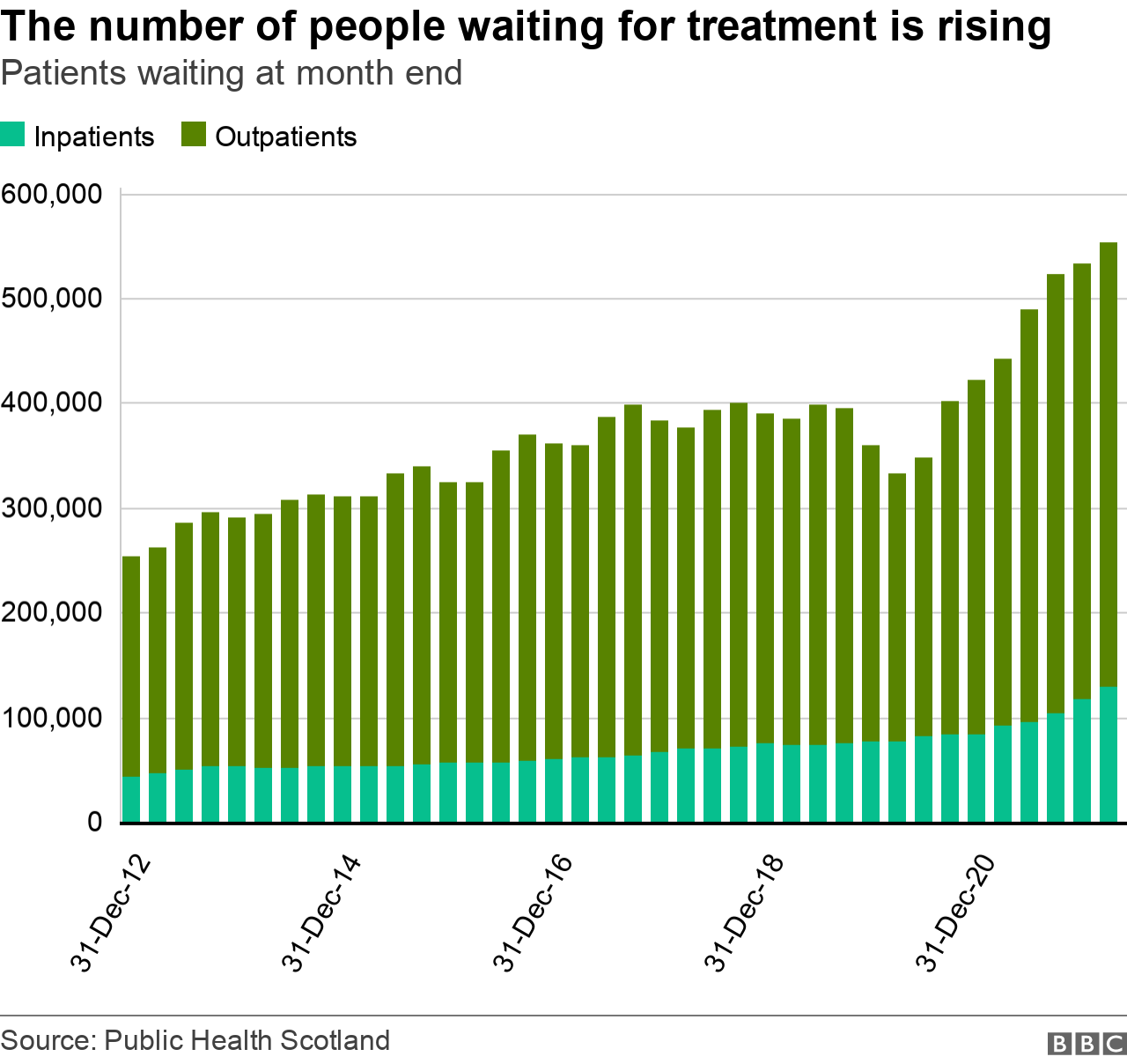Scottish government pledges to 'eradicate' long NHS waiting times
- Published

Patients will be offered hospital appointments outside their local health board areas in a drive to reduce Scotland's record waiting times.
The Scottish government says it wants to "eradicate" waits of more than two years for outpatients in most specialities by 31 August.
Health Secretary Humza Yousaf said "addressing long waits is a key focus of our plans for NHS recovery".
Opposition parties have been critical saying the plan lacked ambition.
The Scottish Conservatives said it ought "to be a given" that no patient waits more than two years for any kind of NHS treatment and Scottish Labour accused Mr Yousaf of "moving the goalposts in order to massage the figures".
This latest pledge on waiting times will be funded by the £1bn allocated to the NHS Recovery Plan.
Last month it emerged more than 553,000 were waiting for outpatient or inpatient treatment at the end of March, equivalent to about one in 10 of the population.
Mr Yousaf said he had asked health boards to take a focussed approach to tackle the waiting lists now that activity in the NHS was beginning to recover from the global health crisis.
He added: "We know that waiting times have grown as a result of the pandemic, which is why we now need to focus on treating these people that are waiting too long for treatment.
"That's why I am announcing some of the most ambitious targets in the UK.
"From speaking to patients and clinicians across the country, I know there is a physical and mental consequence in having to wait a long period to be treated, that is why addressing long waits is a key focus of our plans for NHS recovery."
The targets are designed to treat outpatients in most specialities who have waited:
Two years by the end of August 2022
18 months by the end of December 2022
And one year by the end of March 2023

For day cases in most specialities the targets are to treat patients who have waited:
Two years by the end of September 2022
18 months by the end of September 2023
One year by the end of September 2024
The strategy will involve prioritising and targeting those patients who have waited the longest for treatment, as well as those who require urgent clinical care.
As a result some patients will be offered appointments at the Golden Jubilee University National Hospital in Clydebank, West Dunbartonshire, or at National Treatment Centres as they become operational over the next year.
The approach will also learn from the Centre for Sustainable Delivery, which was established to introduce new ways of delivering care that would create additional capacity for inpatient, day cases and outpatients.


For some specialties like orthopaedics, this is welcome news. Surgeons have been concerned that people waiting for things like hip and knee replacements are not considered urgent cases and so can wait the longest. They will hope this means their patients will become a priority.
For others, it will bring concern. With the NHS so stretched - the question will be at what cost will these targets be met?
Hospitals are already working beyond capacity. People are waiting too long in emergency departments because of a shortage of beds. There are long term shortages of staff who specialise in areas such as diagnostic tests and rehabilitation.
The health secretary says the targets are ambitious but he told me he believes they are realistic and health boards are in a position to deliver. The plan is however short on detail of exactly how this will be achieved.

Alastair Murray, Chair of Scottish Committee for Orthopaedics and Trauma, welcome the announcement.
He said: "It is hoped that the targets set out will drive ongoing efforts to reduce waiting times for orthopaedic surgery in Scotland."
The strain Covid has placed on the NHS was also illustrated on Tuesday when Public Health Scotland data, external revealed the number of patients at Scotland's A&E departments waiting longer than four hours has grown to the highest on record.
Reacting to the announcement, Scottish Conservative health spokesman Craig Hoy said: "The scale of the waiting-time crisis across Scotland's NHS is obvious from the fact that the health secretary has set himself such modest targets for reducing them."
He added: "While the pandemic has clearly made things worse, the SNP's failure to meet waiting-time targets long predates Covid. It stems from their appalling NHS workforce planning over several years, and the breaking of their promise to eradicate the problem of delayed discharge."
Mr Hoy called for fresh resources and increased staffing.
Scottish Labour's Jackie Baillie said the facts were clear - soaring waiting lists; A&E in disarray and burned-out staff.
She added: "Only substantial action to support staff will help save lives - not setting the bar lower and lower."
Scottish Liberal Democrat leader Alex Cole-Hamilton said: "If the Health Secretary gets his way, Scotland's separation from the rest of the UK will happen before these waiting lists are cleared. That's an interesting insight into the SNP's priorities."
Mr Cole-Hamilton added: "It's proof of how much work there is to be done that the current ambition is to stop people waiting years for treatment.
"The SNP are wrong to devote millions of pounds and top officials to independence when the NHS is being overwhelmed and our doctors and nurses are beyond exhausted."
Related topics
- Published11 May 2022
